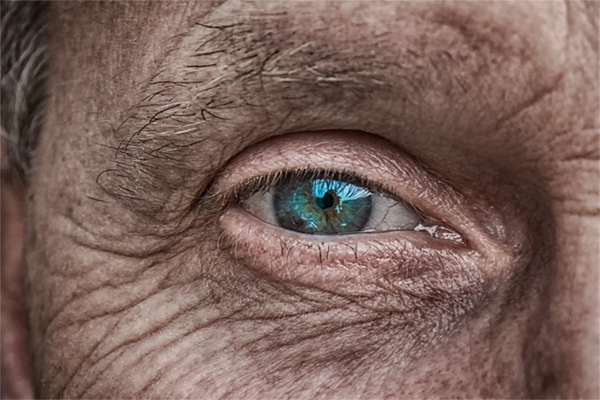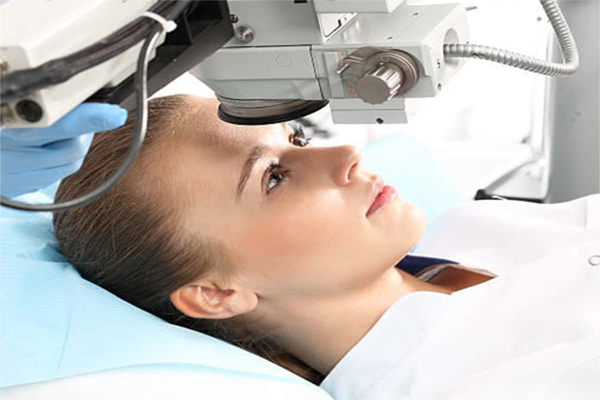Table of Contents
Cataract surgery is a procedure to remove the lens of your eye and, in most cases, replace it with an artificial lens. Normally, the lens of your eye is clear. A cataract causes the lens to become cloudy, which eventually affects your vision. Cataract surgery is performed by an eye doctor (ophthalmologist) on an outpatient basis, which means you don’t have to stay in the hospital after the surgery. Cataract surgery is very common and is generally a safe procedure. Keep reading on The Moj Aramesh Amitis Health Tourism Company to learn more about the benefits and complications of cataract surgery.

Why is cataract surgery performed?
Cataract surgery is performed to treat cataract disease. Cataract disease can cause blurred vision and increased glare light in a person’s eyes. If a cataract interferes with your daily activities, your ophthalmologist may suggest cataract surgery. For example, if cataracts interfere with your eye examinations (examinations to monitor or treat other eye problems, such as age-related macular degeneration or diabetic retinopathy), your ophthalmologist recommends cataract surgery. Most people with cataracts will not have a problem waiting for this surgery. This means that waiting for cataract surgery will not harm your eyes. So you have time to find a qualified ophthalmologist before cataract surgery and perform other pre-cataract surgery procedures. If your vision is still quite good, even with cataracts, you may not need cataract surgery for years after you have the disease. There are some important things to keep in mind when considering a patient’s condition for cataract surgery (such as what to consider before and after cataract surgery). You can ask the questions that come to your mind about having cataract surgery during your ophthalmologist visit.
When considering cataract surgery, keep these questions in mind:
- Can you safely do your daily tasks such as driving?
- Do you have problems reading text or watching TV?
- Do you find it difficult to do activities such as cooking, shopping, or climbing stairs?
- Will the use of various drugs be banned?
- Will vision problems limit your daily activities after the surgery?
- Will your vision problems be completely eliminated?
- Do bright lights make it more difficult to see?
Advantages of Cataract Surgery
As mentioned, cataract surgery is an outpatient procedure. During cataract surgery, a small incision is made in the patient’s cornea. This incision is used to remove the diseased eye lens. Then, after removing the blurred lens, a transparent artificial lens is placed. Cataract surgery can improve your vision, correct astigmatism, and treat myopia and hyperopia. Common symptoms of cataracts include blurred vision, diplopia, difficulty driving at night, the appearance of halos, and glares. Cataract surgery involves the removal of your deteriorated lens and the implantation of an artificial lens that can give you clear vision. Replacing a diseased lens with a new artificial lens can provide you with a clear view. In addition to improving vision, cataract surgery offers other distinct benefits for the patient. Below, we mention some of the benefits of cataract surgery.
Some of the advantages of cataract surgery are:
- Cataract surgery improves your quality of life:
Because cataracts develop slowly, it may take a while to notice that it is getting more difficult to read or drive at night. You may just gradually stop doing the activities you enjoy without knowing why. Having cataracts may even contribute to depression or anxiety. When you have your cataracts removed, you can expect to do many of your favorite activities again. A 2013 study found that quality of life increased by 36 percent after cataract surgery.
- Cataract surgery can decrease the risk of falls and fractures:
Loss of vision is one of the most common reasons for falling. A fall can be dangerous and even fatal for an older person. A study in 2012 examined Medicare patients over the age of 65 who were diagnosed with cataracts. Patients who had cataract surgery had a 16 percent decrease in the risk of hip fracture during the next year. If the patients had severe cataracts, the risk of hip fracture decreased by 23 percent.
- Cataract surgery may help you live longer:
A long-term study in 2013 connected cataract surgery with longer survival for older individuals. Those who had cataract surgery had a 40 percent reduction in mortality risk compared to those who did not have cataract surgery
4.There’s no need to wear glasses anymore:
Depending on the type of cataract surgery (the method chosen for the surgery) as well as the type of artificial lenses implanted in the eye, the rate of vision improvement after cataract surgery will vary. Cataract surgery and the implantation of intraocular lenses inside the eye using advanced medical and surgical technologies and tools may result in your vision being completely corrected. If cataract surgery is done well, you resume your daily activities without the need for glasses.
Possible Risks of Cataract Surgery
Cataract surgery, like any other surgery, can pose complications and risks for the applicant. Of course, most of the possible complications that occur after cataract surgery are not serious and uncommon, and most of them are successfully treated. In the continuation of this article from The Moj Aramesh Amitis Health Tourism Company, we point out some of the possible risks and complications of cataract surgery.
Cataract surgery risks include:
- Inflammation
- Infection
- Bleeding
- Swelling
- Drooping eyelid
- Dislocation of artificial lens
- Retinal detachment
- Glaucoma
- Secondary cataract
All the possible risks and complications mentioned in this section occur at the site of cataract surgery. In case of illness or other eye problems or having serious diseases such as diabetes, the risk of complications related to cataract surgery will increase. Sometimes, cataract surgery does not improve the patient’s vision due to damage to the patient’s eye due to other eye problems and diseases such as glaucoma or macular degeneration. If possible, it will be helpful for you to evaluate and treat other eye problems and diseases before deciding whether to have cataract surgery. In this case, your ophthalmologist can make the best decision for cataract surgery by examining your health and other eye problems. In some cases, your ophthalmologist may not recommend cataract surgery due to your overall status.
As mentioned, cataract surgery, like any other surgery, can pose risks and complications for the patient, including:
- Vision loss
- Experiencing severe pain (untreatable with pain killers)
- Increasing eye bloodshot
- Swollen eyelid
- Blepharospasm
- Observing new spots in vision
Contact your doctor immediately after observing any of these symptoms. Most people who undergo cataract surgery will still need to wear glasses after surgery. When the patient’s eye improves somewhat after cataract surgery, the doctor can examine the patient’s eye to diagnose the appropriate prescription glass for the eye. Usually, in order for the physician to be able to accurately diagnose the patient’s eye score, the patient must wait between one to three months after cataract surgery so that, after a partial recovery, the ophthalmologist can examine the condition of the eye more accurately. If the lens of both eyes has cataracts, the ophthalmologist will usually schedule a second operation after the first eye has healed. Normally, itching and mild discomfort at the site of surgery are normal for a few days after cataract surgery. You should avoid rubbing your eyes or putting pressure on your eyes. The ophthalmologist may ask you to use eye adhesives or eye protection on the day of cataract surgery. The ophthalmologist may also recommend using an eye patch for a few days after cataract surgery. Another thing the ophthalmologist may recommend for the patient while recovering is the use of eye protectors while sleeping. Your ophthalmologist may also prescribe eye drops or other medications to prevent infection, reduce inflammation, and control eye pressure. Sometimes, some of these drugs can be injected into the eye even during cataract surgery. After a few days of cataract surgery, most of the discomfort and pain caused by the surgery should be eliminated. The full recovery occurs within eight weeks. Normally, you can return home the same day you have cataract surgery and you will not need to be hospitalized. But you cannot drive on the same day as cataract surgery. Therefore, before cataract surgery, you should coordinate with a friend who will take you home after the surgery. If necessary, you should also coordinate with someone to take care of you for a week. Because your doctor may limit your activities such as bending, heavy lifting, and other daily activities, including shopping, until about a week after cataract surgery.

Advantages of Cataract Surgery in Iran
Iran is one of the most advanced countries in the field of various surgeries, including eye surgery. Cataract surgery can be a perfect option for you. Keep reading on The Moj Aramesh Amitis Health Tourism Company to learn more about the benefits of cataract surgery in Iran.
The benefits of cataract surgery in Iran are:
- Pay much less than other countries that offer cataract surgery.
- Having skilled and experienced eye surgeons
- Having specialized eye clinics
- Having advanced and well-equipped hospitals
By choosing Iran as your destination for cataract surgery, in addition to having the best facilities and referring to the best eye surgeons, you can also pay less for your cataract surgery.
Concluding Remarks
In this article, from The Moj Aramesh Amitis Health Tourism Company, some of the possible advantages and disadvantages of cataract surgery were mentioned. You can learn more about the benefits and risks of cataract surgery by consulting an ophthalmologist. In general, cataract surgery can improve your vision, restore your independence and freedom to perform various activities, and even prolong your life. Of course, cataract surgery may not be suitable for you. By visiting a reputable ophthalmologist, you can make sure that cataract surgery is right for you. It should be noted that some types of intraocular lenses are covered by insurance.
Author: Sh. Khazaei
Translator: N. Rahimifar




